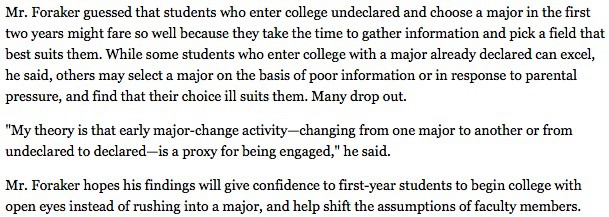I once bumped into a father I know whose daughter had attended the same middle school as my son. I asked him where his daughter was attending college and he told me that she was enrolled at a community college.
I was surprised because Rachel is a very bright girl. The dad explained, however, that his daughter didn’t know what she wanted to major in so he didn’t feel there was any point for her to start at a four-year school.
While this is an extreme case, I run into a lot of parents who are not pleased if their teenagers haven’t selected a college major. To all those parents out there, I want to say: “Take a deep breath!”
It doesn’t matter if a 17 or 18-year-old has no clue what he or she wants to study. In fact, even if a teenager thinks she knows what college major she wants, she might change her mind once she gets to college and is exposed to many disciplines that aren’t offered in high school.
The Advantage of Not Declaring a Major
For parents and teenagers who are stressing about college majors, a new study could help reduce the anxiety. The study, conducted by researchers at Western Kentucky University, suggests that students who enter college without declaring a major may actually enjoy the best chance of graduating in four years.
In the study, students who started Western Kentucky without a declared major, but selected one by the end of their sophomore year, enjoyed the best four-year graduation rate (83.4%), which was significantly higher than other groups of students.
The four-year grad rate among students who started school with a major and never switched was 72.8% and those who switched more than once graduated at a rate of 71.7%. Students who fared the worse were those who waited until their junior year to declare their majors.
You are probably wondering why students who arrived at college undecided were better able to graduate on time. Matthew Foraker, the research coordinator at Western Kentucy, who examined the grad rates of 7,000 students, offered this suggestion in a Chronicle of Higher Education article:
You can read The Chronicle of Higher Education‘s article on the research here: Changing Majors Is No Big Deal If the Timing Is Right.
An Overseas Look at Majors
The research in Kentucky coincides with a study that I wrote about in 2009 that looked at the impact declaring a major had on future careers. Ofer Malamud, an assistant professor of economics at the University of Chicago, looked at the career choices of college graduates who attended schools in Great Britain and Scotland and made some fascinating discoveries.
In Great Britain, students need to select an academic major while still in high school. In contrast, Scottish undergrads take a broad variety of courses before specializing in their last two years.
The British college graduates who had to pick majors as teenagers were less likely to hold jobs related to their fields of study. Scottish grads, however, who had more time to explore majors before settling on one, were more likely to end up at jobs related to their academic work.
Here’s what Inside Higher Ed observed about the findings:
The students at Scottish institutions seem more likely to have chosen to study fields that successfully aligned with their career interest, says Malamud, success that he attributes to the time and freedom they’re given to experiment with a broad range of fields, and to learn both what they like and what they’re good at.
Bottom Line:=
Don’t fret if your child enters college without a major. The best way to start college is to vow to explore as many fields as possible. If you want a field guide that explains how to do that, I’d highly recommend this book: The Thinking Students Guide to College: 75 Tips for Getting a Better Education.
Lynn O’Shaughnessy is the author of The College Solution: A Guide to Everyone Looking for the Right School at the Right Price.
5 Tips On Choosing a College Major


Pingback: 2016 Update: Part 4
Parents now assume the responsibility for loans ( Parent Plus). It makes it difficult on them when after 2 years of an expensive school the major has not been declared. I think it is wise to start at a Community College if the student has no idea what he or she wants to do.
Some scholarships are based on the major, such as schience, and that could hurt you if you don’t “declare” that on a scholarship application.
When looking at schools with my son, every single tour guide we had, at every single school, had changed his or her major at least once. Exploration is what college is about!
HI M,
I couldn’t agree with you more. I say this as a history major who switched to journalism in college and I will always be happy that I did!
Lynn O’Shaughnessy